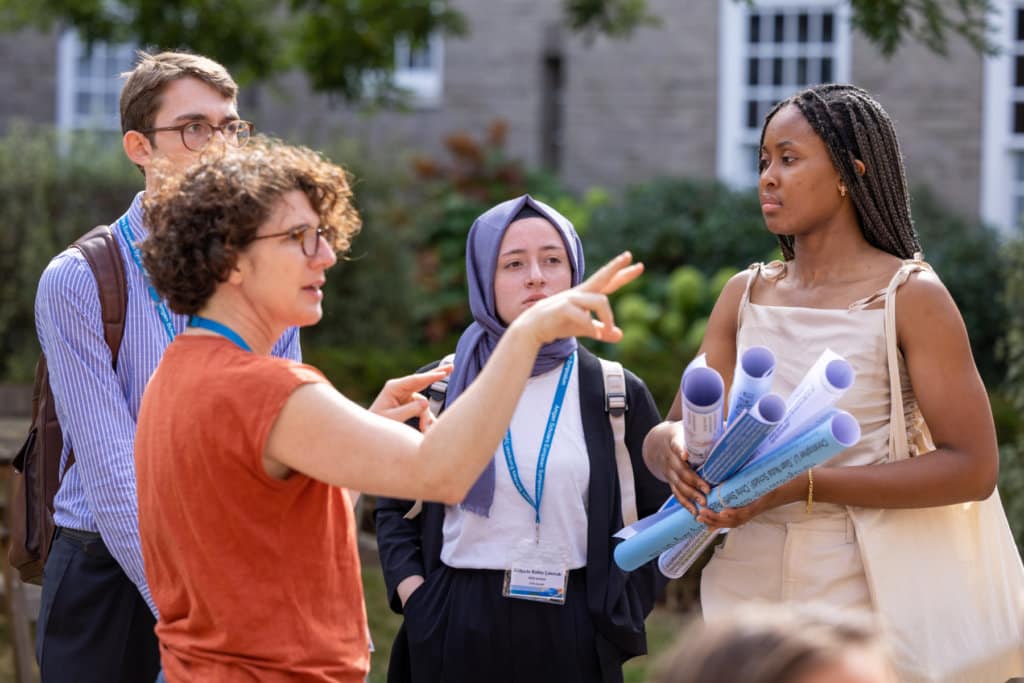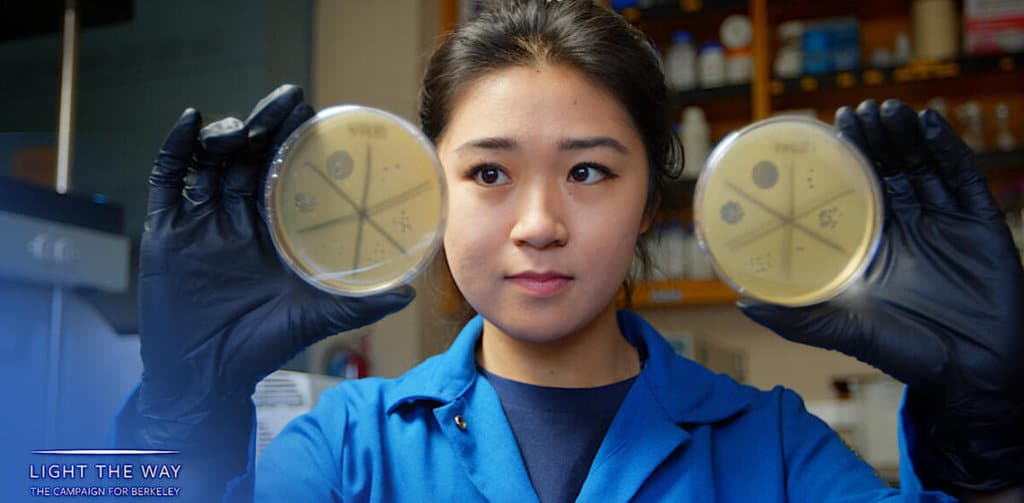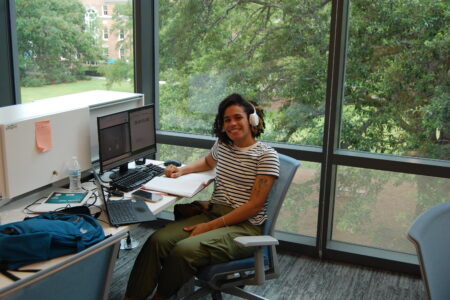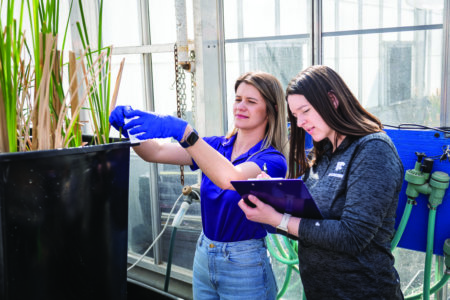
The biological sciences, encompassing fields from genetics and ecology to microbiology and bioinformatics, have long been the frontier of understanding life’s intricacies. What is now emerging as an equally crucial aspect is the emphasis on inclusivity within these scientific pursuits. By fostering diverse voices, perspectives, and talents, the biological sciences are not only enriching its intellectual landscape but also embracing the concept that innovation thrives in environments where everyone’s voice is heard and valued.
There is certainly a demand for more individuals in the field. This is especially because the biological sciences increasingly focus outward, addressing the most pressing challenges facing our world today, and there are many such challenges. Since the start of the Industrial Revolution, the amount of CO2 in the atmosphere has risen by over 50%. It is still growing. From climate change and biodiversity loss to global health crises, researchers in these fields are at the forefront of crafting solutions that resonate far beyond the laboratory walls.
Here are three exemplary universities with world-leading biological sciences programmes that celebrate inclusive environments whilst tackling real-world problems:
University of Cambridge, School of Biological Sciences

At the University of Cambridge, students of the highest intellectual potential, irrespective of social, racial, religious and financial considerations, get to experience the excitement of scientific, lab-based research across the biological sciences. Source: The University of Cambridge
At the University of Cambridge, in the School of Biological Sciences, new Masters courses (MPhil in Biological Sciences by Advanced Study) bring together motivated students with different lived experiences to realise their aspirations. This School is behind some of the biggest breakthroughs in research today, such as discovering a more durable drug for poxviruses, how unborn babies use “greedy” genes from dads to “remote-control” mums into feeding them extra food and a community of thousands of different bacteria living in your bowels keep you healthy and interact with medications. This School also considers equality and diversity as important goals, with a clear focus on research culture, fostering creativity and excellence across the biological sciences.
The new Masters courses ensure that more students get the opportunity to experience the excitement of scientific, lab-based research, in the areas of Biomolecular Science, Cell Science, Crop Science, Developmental Biology, Infection Biology and Molecular Immunology, and Reproduction and Embryogenesis.
Students spend 11 months in a supportive, research environment that is world-class and inclusive – where ideas are generated and can flourish. At the heart of the experience is an eight-month long lab-based project – chosen from one of the many on offer by participating research labs. Small group, topic-specific teaching, is interactive and discussion-based. This is complemented by professional skills training and personal development workshops.
What sets the MPhil in Biological Sciences by Advanced Study apart is how it bridges the gap between less research-intensive undergraduate degrees and postgraduate education — and in how it ultimately leads to a wide range of careers, including advanced research in industry or competitive doctoral programmes. Such an expansive list of opportunities is a result of being valued and supported in a School that achieves the highest levels of international excellence in research and scholarship. Learn more about how the School welcomes students of the highest intellectual potential, irrespective of social, racial, religious and financial considerations, at its Widening Participation page.
UC Berkeley, Division of Biological Sciences

Part of UC Berkeley’s College of Letters & Science, the Division of Biological Sciences is the launching pad for new and innovative insights. Source: UC Berkeley
UC Berkeley’s College of Letters & Science has quite a rich history. Its faculty and alumni has been responsible for key discoveries such as vitamin E, identifying the flu vius and developing the underpinnings of statistical theory. Nobel Laureate poet Czeslaw Milosz and artist Hans Hofmann was part of its faculty, and outstanding alumni include Nobel Prize laureates Thomas Sargent, David Wineland, and Barry Barish. The college boasts 80 majors and students may curate programme that best suits their goals and passions.
Part of UC Berkeley’s College of Letters & Science, the Division of Biological Sciences is where big shifts in the world’s understanding of the function and behaviour of living organisms happen. Spearheading cutting-edge research in their laboratories, the department is made up of 112 full-time faculty who are some of the world’s leading scientific minds.
The Division of Biological Sciences focuses on deciphering the interplay of living systems from the intracellular to the ecosystemic to the planetary. Some of the research units in the division include Cancer Research Laboratory, Innovative Genomics Institute, Electron Microscope Laboratory, Helen Wills Neuroscience Institute, CiBER (Center for Integrative Biomechanics in Education and Research), Henry Wheeler Center for Emerging and Neglected Diseases, California Institute for Quantitative Biosciences, Immunotherapeutics and Vaccine Research Initiative.
The divisions recognises the intrinsic relationship between diversity and excellence in all its endeavours — upholding UC Berkeley’s principles of community. These include embracing open and equitable access to opportunities for learning and development as an obligation and goal, as well as affirming the dignity of all individuals and striving to uphold a just community in which discrimination and hate are not tolerated.
National University of Singapore, Department of Biological Sciences

NUS’s Department of Biological Sciences explores key life science questions in the areas of human health, climate change and food security. Source: NUS
The National University of Singapore’s (NUS) Department of Biological Sciences was created when two of the university’s oldest departments were merged: the Department of Botany, founded in 1949 and the Department of Zoology, founded in 1950. Consolidating the achievements of both these prestigious divisions, the Department of Biological Sciences is now the single largest department offering courses in the area.
The department explores key life science questions in the areas of human health, climate change and food security. The research areas have been focused into five categories to maximise the school’s efforts: Fish Biology & Aquaculture, Plant Growth & Development, Biotechnology, Biodiversity & Ecology, and Structural Biology, Functional Genomics & Proteomics.
With numerous centres, museums and facilities under its wing, the Department of Biological Sciences manages to provide the best education, along with priceless research opportunities which arm students with critical thinking, analytical and communication skills. No matter your degree, these experiences will have you prepared for the future.
While the flagship undergraduate programme is a Bachelor of Science (Honours) in Life Sciences, students can choose to specialise in Biomedical Science (BMS), and Ecology, Evolution and Biodiversity (EEB). There are three Masters by coursework programmes which give students skills in biodiversity conservation and nature-based climate solutions, biotechnology and forensic science with an emphasis on coursework.
NUS believes are differences really are what make us stronger. To this end, it has invested in initiatives, such as platforms where distinguished female alumni are celebrated and can inspire others and the Hannah’s Blessings Bursary, which supports financially-needy undergraduates with special needs, particularly those with physical disabilities. These are part of the university-wide policy to not only admit students with diverse backgrounds but also making them feel included so they feel they belong there and what they say and do matters. A network of offices and units ensure that the needs and preferences of different student groups are met.
*Some of the institutions featured on this article are commercial partners of Study International










